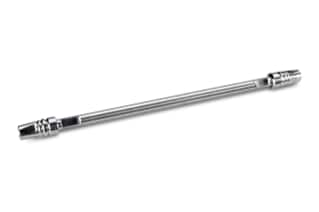
|
Chemistry |
C18 |
|
Separation Mode |
SuperCritical Fluid (SFC) |
|
Particle Substrate |
Silica |
|
Maximum Pressure |
6000 psi (415 Bar) |
|
Endcapped |
No |
|
Bonding Technology |
C18 SB |
|
Silanol Activity |
High |
|
Particle Shape |
Spherical |
|
Particle Size |
1.8 µm |
|
Endfitting Type |
Parker-style |
|
Pore Size |
100 Å |
|
Format |
Column |
|
Surface Area |
230 |
|
System |
SFC, UPC2 |
|
Particle Technology |
HSS |
|
Technique |
SFC, SFC/MS |
|
Inner Diameter |
2.1 mm |
|
Length |
150 mm |
|
Carbon Load |
8.5 % |
|
eCord |
Yes |
|
UNSPSC |
41115711 |
|
Brand |
Viridis |
|
Product Type |
Columns |
|
Units per Package |
1 pk |
Viridis HSS C18 SB Column, 100Å, 1.8 µm, 2.1 mm X 150 mm, 1/pk
Because it has been specifically created and examined for the ACQUITY UPC2 system, the Waters Viridis HSS C18 SB Column is a valuable addition to your collection of lab equipment. Due to stringent product specifications, low metal content, and Waters' extensive chromatographic silica production knowledge, Viridis Silica lab equipment, such as the Viridis HSS C18 SB Column featured here, are extraordinarily reproducible and predictable. They can be used for preparative analytical and purification columns. With and without additives, it is frequently employed in archival SFC separations and has good retention, peak shape, and selectivity.
As an added advantage, Viridis Columns exhibit achiral SFC selectivities. The unique Ethylene Bridged Hybrid (BEH), Charged Surface Hybrid (CSH), and High-Strength Silica (HSS) particle technologies are used to create these columns. Even for well-retained basic achiral compounds, excellent peak shapes are produced under SFC predictions by the reduction and control of surface silanol activity on Viridis particles.
The sub-2 µm and 3.5 µm particle size Viridis lab equipment variations exhibit remarkable efficiency and resolution. Utilizing our online store, you may browse the whole selection of Viridis columns and get the precise lab supplies you need to suit your chromatographic requirements, as well as items that complement one another. You can buy lab equipment straight from us, so you know you are investing in only genuine Waters goods.
The Waters Reversed-Phase QC Reference Material might be something else you want to research and consider purchasing. The Reversed-Phase QC Reference Material is a very complex mixture of reference material because it contains components that can be challenging to separate. It is suitable for use when regularly carrying out difficult experiments because it is designed to provide this level of complexity. Seven substances, including uracil, butyl paraben, naphthalene, propranolol, di-propylphthalate, acenaphthene, and amitriptyline at pH 7, are included in the reversed-phase quality control reference material.
What Is The Maximum Pressure That The Viridis HSS C18 SB Column Can Sustain?
The Waters Viridis HSS C18 SB Column listed here is able to sustain a maximum of 6,000 psi (415 Bar) pressure.
What Is The Process Of Sfc Chromatography?
In supercritical fluid chromatography (SFC), the mobile phase is a supercritical fluid that functions like a compressible fluid with very low viscosity and where mass transfer occurs very quickly, enabling the use of high linear velocities and, consequently, very quick analysis times without any loss of efficiency.